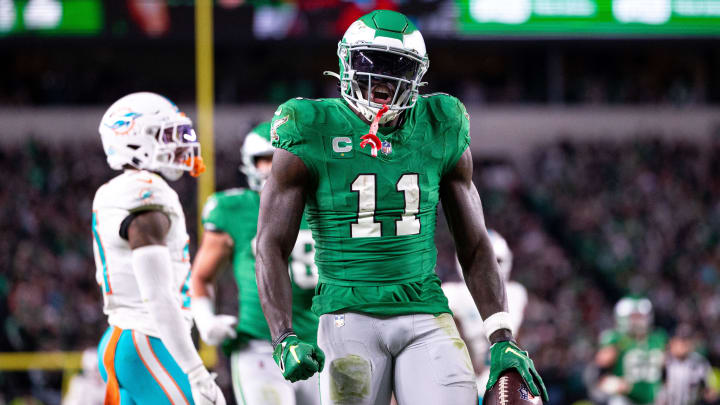Fantasy Football Draft Results: Michael Fabiano's FLEX 14-Team Half-PPR Strategy

Subscribe to Fantasy Dirt: Apple | Spotify | YouTube
When you’re in the fantasy football industry, the month of August is loaded with different drafts. Beyond my countless best-ball leagues, I’ll participate in anywhere from 12-16 redrafts within a 30-day period. I’ve already detailed one of those drafts, the King’s Classic, and now I want to share another industry fantasy draft, the 14-team FLEX Leagues.
The FLEX (Fantasy League of Experts) has some quirks in the lineup requirements and the scoring system. Each team is required to start one quarterback, two running backs, three wide receivers and two flexes (running back, wide receiver, tight end). There is no tight end required in the starting lineup, which you’ll see in how I constructed my own roster. The roster also includes a total of six reserve spots and allows up to five injured spots.
All touchdowns are worth just five points instead of six (weird, right?). Quarterbacks get a point for every 15 passing yards instead of the typical 25. A reception is worth half a point, and one point is earned for every five rushing and receiving yards instead of the typical 10.
Based on these guidelines, tight ends aren’t nearly as valuable. In fact, the leading player at the position last season (Sam LaPorta) finished with 276 points. The leading running back (Christian McCaffrey) scored 541 points(!) and the leading wideout, CeeDee Lamb, had 509 points. Furthermore, LaPorta would have only been the RB24 and the WR24!
With that said, here’s how I built this 14-player fantasy football roster.
Click here to see the full draft results.
Round 1 (No. 9 Overall): A.J. Brown, WR, Philadelphia Eagles: Brown finished fifth among non-quarterbacks based on this scoring system a season ago, so I was happy to land him with the ninth overall pick. He’ll remain the unquestioned top option in the passing game for an explosive Eagles offense.
Round 2 (No. 20 Overall): Chris Olave, WR, New Orleans Saints: Olave is entering his third season, and I think it will be his best from a statistical perspective. That’s due in part to the installation of coordinator Klint Kubiak’s offense, which should feature Olave and allow him more chances to produce.
Round 3 (No. 37 Overall): DJ Moore, WR, Chicago Bears: Moore finished sixth in this format a season ago, but he’ll regress with Keenan Allen and Rome Odunze now in the mix. Still, landing him as my third receiver in this format bakes in that projected regression and makes him a solid option.
Round 4 (No. 48 Overall): Kenneth Walker, RB, Seattle Seahawks: I was hoping Rachaad White or James Cook would fall to me in this round, but they both were picked before me. As a result, and needing to pick a runner, I went with Walker. Considering I waited until the fourth round to draft my first running back, I’m satisfied with Walker leading this particular fantasy backfield.
Round 5 (No. 65 Overall): Jayden Reed, WR, Green Bay Packers: I could have taken a second running back here, but I didn’t love anyone who was on the board. As a result, I took one of my favorites in Reed. I think he’ll lead all Packers wide receivers in fantasy points in his second NFL season.
Round 6 (No. 76 Overall): Ladd McConkey, WR, Los Angeles Chargers: I was once again thinking about taking a running back here, but there were still some good ones on the board. So, I gambled and took yet another wideout, McConkey. Maybe I’ll regret not taking Zamir White (who went with the next pick), but I love McConkey’s potential as the top wideout in the Chargers offense.
Round 7 (No. 93 Overall): Javonte Williams, RB, Denver Broncos: Of course, there was a huge run on running backs right after I picked McConkey. White, D’Andre Swift, Najee Harris, Raheem Mostert, Tony Pollard, and Zack Moss (who I was hoping fell to me) all came off the board, and I didn’t want to wait another round to address the position. As a result, I took a chance on Williams. I know the Broncos backfield is crowded, but Williams is now a full year removed from a serious knee injury. Who knows, maybe he’ll end up being one of my best draft bargains.
Round 8 (No. 104 Overall): Austin Ekeler, RB, Washington Commanders: I no longer need wideouts (I have five), so I went with another running back in Ekeler. Even in a half-point PPR format, I feel good about him as a flex and occasional RB2 option, especially since I landed him in the eighth round.
Round 9 (No. 121 Overall): Jared Goff, QB, Detroit Lions: Quarterbacks are valuable in this league, so why did I wait so long to draft one? Well, Goff was the QB9 in this format a season ago, and he’s reliable at home. Goff also plays most of his games in domes, so I feel good about him as the starter for this fantasy team. I can also play the matchups with Goff and my next draft pick…
Round 10 (No. 132 Overall): Tua Tagovailoa, QB, Miami Dolphins: Tagovailoa was a top-12 quarterback in standard scoring leagues a year ago, and he was QB9 in the FLEX format. I’m not in love with him as a regular fantasy starter, but Tua will be an attractive matchup-based option in 2024.
Round 11 (No. 149 Overall): Kimani Vidal, RB, Los Angeles Chargers: I didn’t use a true Zero RB strategy in this draft, but it was close. So, in Zero RB fashion, it’s time to start throwing darts at runners. Enter Vidal, who is one of my favorite late-round targets based on his situation in Los Angeles.
Round 12 (No. 160 Overall): Audric Estime, RB, Denver Broncos: The running back dart throws continue, with Estime. With Javonte Williams already on this roster, I didn’t mind grabbing the back who might end up being his handcuff. Like Vidal, I like taking a flier on this rookie as a fifth runner.
Round 13 (No. 177 Overall): Michael Wilson, WR, Arizona Cardinals: I’m pretty loaded at wide receiver, but there just wasn’t a running back I liked who was still on the board. As a result, I went with Wilson. He projects as the third option in what could become a high-scoring Cardinals pass attack.
Round 14 (No. 188 Overall): Deshaun Watson, QB, Cleveland Browns: That’s right folks... I didn’t draft a single tight end. Based on the scoring system, it just wasn’t worth it at any point in the draft for me. Instead, I did something I typically don’t do: draft a third quarterback. Who knows, Watson could end up making meaningful starts for this fantasy team during the course of the season.
Final Roster
QB: Jared Goff, Tua Tagovailoa, Deshaun Watson
RB: Kenneth Walker, Javonte Williams, Austin Ekeler, Kimani Vidal, Audric Estime
WR: A.J. Brown, Chris Olave, D.J. Moore, Jayden Reed, Ladd McConkey, Michael Wilson
TE: None
